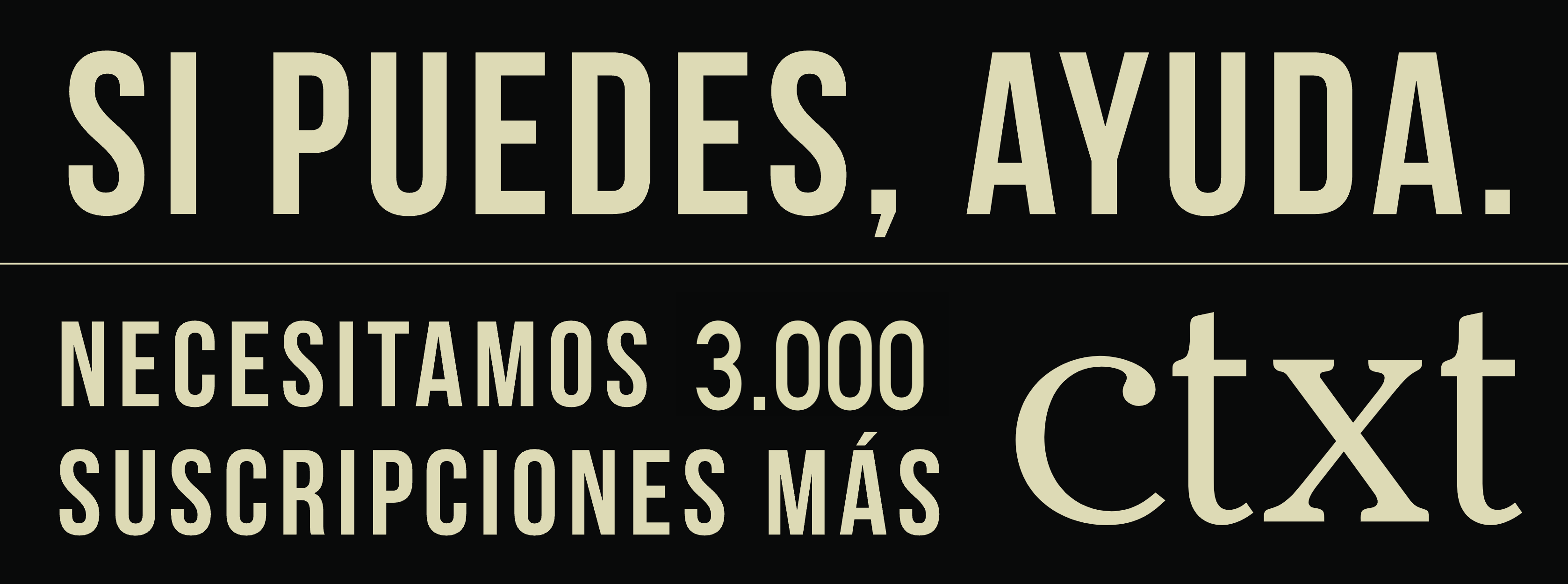Kathi Weeks / FEMINIST THEORIST
"Work is not the essence of what it means to be human"
Álvaro Guzmán Bastida New York , 19/04/2016

Kathi Weeks
En CTXT podemos mantener nuestra radical independencia gracias a que las suscripciones suponen el 70% de los ingresos. No aceptamos “noticias” patrocinadas y apenas tenemos publicidad. Si puedes apoyarnos desde 3 euros mensuales, suscribete aquí
In 1930, John Maynard Keynes predicted that, thanks to the raises in productivity and the incorporation of women into the workforce, his grandchildren’s generation would work 15 hour weeks. Three generations later, we work more than ever and the Left has for the most part abandoned the struggles to reduce work. Drawing from the Italian Autonomists of the 1970s, feminist theorist Kathi Weeks vindicates such struggles in her book ‘The Problem with Work.’ She tells CTXT about the power of ‘utopian demands,’ and why she thinks we should focus on working fewer hours and creating the conditions to imagine a world outside of work.
How do you define the kind of work that you have issues with?
In this context, work is productive activity that’s modeled on waged work. So if you ask people what work they do, they assume you mean what’s their paid work. It’s not exclusive to that, so over history, there’s struggles about what should be recognized as work. I’m thinking about feminist struggles to try to get domestic work to be recognized as real work, even though it might not be waged.
Your book is in part a critique of the Left’s traditional ‘productivist’ approach to politics. What’s that tradition about?
There’s been a general tendency to accept the idea that work is a sort of sacred human endeavor. You can think of certain kind of mainstream discourses in feminism that are really dedicated to seeking equal opportunities in waged work for women, and argue waged work would be women’s ticket out of culturally mandated domesticity. Within the left in general, there’s been a Social-democratic emphasis on jobs programs, as bringing people into work and empowering them as workers.
What are you offering to counter that ‘productivist’ tradition?
What we really need is a much more full-frontal assault on the cultures and institutions of work, on its ideologies and its structures. And I don’t think that those discourses that I mentioned are capable of providing that because they share some of the values and the insights and the assumptions of it. In this day and age, when work is not working, when it’s so clearly breaking down as a system of income distribution, as a way of belonging to a larger project, then I think it’s really time to go after it and some of the ideologies that support it, that sing the praises of work and make it sounds as if it’s something that’s more fully human or more important than other kinds of pastimes and practices.
You write about the disciplinary aspect of work. How central is it to our culture?
Oh, I think it’s absolutely crucial. That is what work is at this point. Clearly, the economic system is working very well as a way to produce capital, but it’s not as a way to distribute income. How it does function still is as a system of disciplining people, of assigning responsibility for those people who are excluded from work, by blaming them for their lack of effort or initiative.
Some of that is self-imposed, right? It’s tied to hegemony in a way….
Yes.
Is that what the work ethic is about?
It’s hard to disentangle the structures and ideologies, and certainly, there are plenty of carrots and sticks that lead us into work, you know –the need to pay the rent, obviously, and food, being the most important. But those are reinforced as disciplinary apparatuses by these cultural formations and ideologies of work as our highest duty or a moral requirement. They work together in tandem.
Let’s unpack that a little bit – Many on the Left argue that it’s not work itself that alienating, but the conditions under which it’s developed, or the lack of democracy in the way decisions are made about work. What do you say to that?
That is still this tradition that wants to eliminate the exploitative and alienating categories of waged labor under capitalism. And I would say, ‘Fine, but there’s much more work to be done.’ We have to alter the place of waged labor in our lives and in our social imaginaries about what we should be doing. We don’t just want better work; we want less work. And that insight is a difficult ball to keep juggling when you’re also arguing, ‘But if work was wonderful, we would want to do it all the time.’
So you’re saying it’s a fantasy
And it’s a dangerous fantasy! Practically speaking, because what you’re likely to get with that argument is jobs at McDonald’s for everyone, which would obviously be a failure. But even if we were all working at – I don’t know what the fantasy is of a job that would be so satisfying and unallienating that we’d want to do it all the time- obviously that’s what some of these corporations like Google purport to offer to their employees. They succeed in doing that because of this ideology of work and our lack of time and imagination to cultivate the rich full lives outside of work and its satellite- the family.
Part of the mainstream feminist agenda is the discourse on balancing work and family. You reject that. Why?
Work and family are part of the same system. They are not alternatives. One organizes certain kind of work and the other organizes, usually by its gender differentiation of tasks, another kind. Work may be important, family may be important, but they are part of the same system, and I want us to try to think about the possibility of alternatives to both of these kinds of institutions.
We also live at times when there’s very high percentages of unemployment. A lot of people are to be desperate to get work, to get a job. And yet, there’s also an issue with over-work- We work longer and longer hours even as productivity raises. How do you tackle such seemingly contradictory trends? Is that what you were saying about the system of work not working?
Yes! And in terms of some some of the traditional Marxist class-based analysis, those groups would have nothing in common – the overworked and the unemployed. A lot of us have problems with work, whether it is because we work too much or because we can’t find work. It’s an opportunity to raise some broader questions about the larger system of waged work as a mode of social inclusion and income distribution. Because it’s not just not working for the unemployed; it’s not working for most people at some level.
You draw inspiration from the Italian autonomous movement of the 70s and their critique of work, which they articulate as a refusal of work. What’s that about and how is it relevant today?
The refusal of work was understood not as a prescription for individuals –most of us don’t have the luxury of refusing work; there’s no other alternative- but as a collective project. It’s about recognizing all the ways that we refuse work on a daily basis –daydreaming, showing up late, having a bad attitude at work- but also taking on as a political project saying no to this larger system of work.
What about the movement to demand that domestic work in the 70s be paid – the ‘Wages for Housework’ movement? You also draw inspiration from it, correct?
They made the refusal of work even more relevant, if more difficult. It became linked to a particular demand. We want wages for housework. It was really instructive and relevant – By saying it was work that deserved a wage, they were not celebrating it. They were also trying to demystify it, and dethrone it as this sort of mystified labor of women’s love for their families. So they’re trying to say, ‘Look! This is real work,’ at the same time, they are saying, ‘It’s only work.’
What was the value of saying that?
It involves a critique of the institution of the family, the gender division of labor and the rest of it too. They understood this demand fully as a provocation. They were trying to argue that the process of demanding wages for housework was in itself a valuable kind of political activity. At that time, in the 1970s, you said wages for housework and the reaction was, ‘What?’ So even to understand the demand you had to learn something about the critical analysis. This was understood as a reform that would obviously help rather than hurt but it was clearly also something else- which I’m calling a utopian demand.
Let’s talk about that phrase. One thinks of the term demand as something very concrete, for the here and now, and even reformist, whereas utopia has almost the opposite connotations. You talked about demands as provocations. Is that where this sort of connection begins?
Yes. Some of the demands that interest me are those that are not just reforms that can improve people’s lives’ and are winnable – but also reforms that can, in the process of struggling for them and debating them, open up new horizons of thinking and desiring and imagining the world we want to live in. For example, the demand for shorter hours, on the one hand, it’s a way to make work available for more people, it’s a way to give people more time to do the other kinds of productive activities they have to do outside the space of waged work, etc. But also, just in the process of demanding it, it forces people to say, ‘Well, what would I do if I had more time?’ Also, it’s not that difficult for people to understand why you might want a wage increase. To understand why it might be reasonable to argue for a guaranteed basic income to everyone, or a six hour working day, I think you have to make a bigger effort to comprehend what’s wrong with the system today, so it’s also an opportunity to develop a larger critique. So the more utopian the demand, the more it’s based on a substantial critique, and the more it forces us to think imaginatively about a different way of organizing that. There’s an art to demanding.
The two you propose- basic income and shorter hours- seem somehow utopian but also imaginable. Why do you pick those two?
They force us to imagine a life outside of work. And I think in that sense, they pose a much more forceful challenge to the idea that work should be the center of our existence. Particularly, the demand for a basic income helps us recognize how utterly broken the wage work system is.
And how broken is it?
It’s really broken! I mean --higher wages will help the people who have access to work in the first place, but so many people don’t, and there is some many of our arguable useful or productive activities that are not remunerated by employers. We have these ‘jobless recoveries.’ It’s clear today that the system is not working in very fundamental ways.
One of the counter-arguments to universal basic income is that it might lead society to progress less. When you decouple work from income is that going to lead to productivity being idled and society not moving forward?
I always find it interesting that there is two lines of dominant critique, and one is that, ‘But people need work! We are laborers, we need to realize our capacities, so you’d be depriving them of something very human.’ On the other side, there’s the fear that – ‘Nobody will ever work again!’ Recognizing that the only reason you do it is that there is this monetary incentive, that necessity is the only thing that drives people into work. And I just find it funny that these are completely divergent critiques, and I don’t find either of them very persuasive. I don’t think that work is the be all and end all of what it means to be human. We can understand other ways of being in the world and engaging with others and the environment that are not on the model of work. But also, a guaranteed basic income, likely, most people would still want to supplement that income with some kind of waged work. It’s a supplement to waged work –that’s why it’s not a revolutionary demand. As it is now, most people are engaged, arguably, in work that is not socially necessary. It would be hard pressed to understand someone working to create the thirty seventh brand of shampoo as doing something that is socially necessary.
When you talk about the possibilities that fewer hours and universal basic income might create, do you have anything in mind?
I don’t usually play that game. What I’m trying to do is actually force people to think for themselves –what would you do? And why are you resistant to it? I think you should be making art and doing politics, but other people might have different ideas.
You’re alluding to some sort of fear of freedom. Is that part of what’s going on?
Absolutely! I think you get this fear that either you will lose what it means to be a human being –which again offers a great insight into how the culture has constructed us as humans- or that it would lead to some kind of massive social breakdown, like riots. So we envision this sort of mass indiscipline, because we imagine work as the only tool that can keep us in check, or we imagine completely passive people who can’t get out of bed. And, again, I think there’s real fear about both of them. That fear is really pervasive and instructive about the place of work in our imaginaries about what it means to be human and be in relationship with other people.
---------------------
In 1930, John Maynard Keynes predicted that, thanks to the raises in productivity and the incorporation of women into the workforce, his grandchildren’s generation would work 15 hour weeks. Three generations later, we work more than ever and the Left has for the most part abandoned the struggles to...
Autor >
Álvaro Guzmán Bastida
Nacido en Pamplona en plenos Sanfermines, ha vivido en Barcelona, Londres, Misuri, Carolina del Norte, Macondo, Buenos Aires y, ahora, Nueva York. Dicen que estudió dos másteres, de Periodismo y Política, en Columbia, que trabajó en Al Jazeera, y que tiene los pies planos. Escribe sobre política, economía, cultura y movimientos sociales, pero en realidad, solo le importa el resultado de Osasuna el domingo.
Suscríbete a CTXT
Orgullosas
de llegar tarde
a las últimas noticias
Gracias a tu suscripción podemos ejercer un periodismo público y en libertad.
¿Quieres suscribirte a CTXT por solo 6 euros al mes? Pulsa aquí




